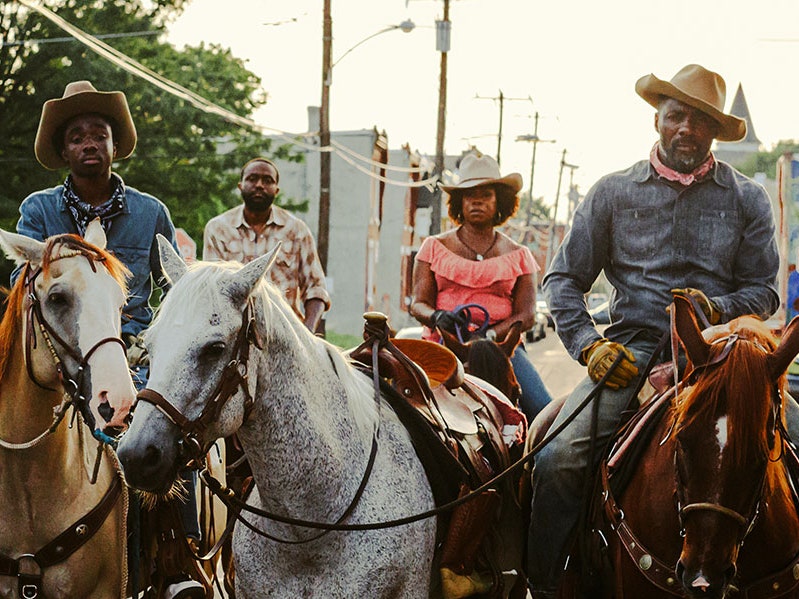
Cultural identity is an integral part of the human experience which makes its preservation for cultures that find themselves under threat of shrinking or eradication often the subject of much concern. In our modern world, it often takes place through the lens of gentrification and how the encroachment of development threatens existing communities and cultures. A new film from Netflix explores one such case.
Based on the novel Ghetto Cowboy by G. Neri, Concrete Cowboy introduces us to Cole (Caleb McLaughlin), a troubled teen from Detroit who is sent to live with his stern father, Harp (Idris Elba) in North Philadelphia. Harp is part of a dwindling enclave of urban cowboys in the neighborhood and Cole soon finds himself torn between his troubled path toward the street alongside his friend Smush (Jharrel Jerome) and the world of urban horseback riding.
The film’s larger conflict between its central urban cowboys and the city of Philadelphia explores a dying culture desperate to hold onto and protect what little they have left from the encroaching specter of an expanding enemy; in the micro sense, big city development, but on a larger scale, change itself. What results is an interesting inversion of “Cowboys and Indians” with the “cowboys” this time being the long-time inhabitants of a quickly fading culture fighting to survive against a larger, more powerful, more advanced invading army of real estate developers and the politicians they have enlisted in their cause. This struggle connects to our own reality and the encroaching shadow of gentrification on black culture in many major cities nationwide, providing Concrete Cowboy with much of its topicality and thematic strength. Culture is one of the great unifiers of humanity, particularly for marginalized groups. Being able to hold onto the things that have been passed down from generations past becomes increasingly important as you lose more in your present, a way to maintain dignity and control in a world that tries to deny both. As the cowboys fight for theirs, a statement is made on the experiences of many in the audience.
Feature length debut director Ricky Staub and his cowriter Dan Walser do a superb job in the way they depict Cole’s character arc throughout the film and interweave horseback riding into his story as a parallel. This stands out most through Cole’s relationship with his own horse. Throughout the film, the cowboys regal Cole with stories of the glory days of black cowboys and what set them apart from the white peers in the old West when it came to breaking in horses. The black cowboys knew the horses needed love and freedom to be properly tamed as opposed to the brutal breaking that whites tried to employ. In this regard, Cole and the equines end up being similar; in order to overcome his behavioral issues, his unresolved issues with his father’s lack of presence in his life, Cole needed the love of his horse Boo in order to break free from his affinity for the streets and his hard exterior. We’re treated to a visual allegory for this turning point in Cole’s life when he is tasked with recovering the unruly Boo following the horse’s escape from the stables. As Cole calms the horse and mounts him for the first time, his metaphorical climbing over his internal struggle is complete.
Cole and Harp’s relationship is another catalyst in Cole’s development of course and the chemistry between Caleb McLoughlin and Idris Elba makes the relationship resonant and believable. Father-son relationships are often fraught with complication and a veneer of toughness and conflict that can leave some feeling as if they are devoid of the love that we typically seek in our popular depictions of parental love, but Concrete Cowboy does well in portraying how effective love with rougher edges from a father can have in molding and inspiring a child as hugs and kisses do. McLoughlin is, in a word, fantastic in his first foray into more mature material following his emergence into the cultural zeitgeist with Netflix’s Stranger Things. If there is any justice in the world, this film will serve as his breakout into the adult stage of his career and the opportunities that come along with such maturation. Jharrel Jerome is fantastic in his supporting role as the figurative devil/cautionary tale on Cole’s left shoulder and steadily headed toward stardom. Lorraine Toussaint’s presence is the gift it always is as the neighbor who imparts the softer, more motherly wisdom for Cole when needed.
Jamil Prattis (Paris) and Ivannah Mercedes (Esha), real Philadelphia horse riders, also offer great performances in the small supporting roles as first time actors. Prattis specifically deftly handles a role that carries a substantial amount of emotional weight and requires skill to back it up like a pure natural. Credit for all of these superb performances must go to the Staub, who not only gets the most from his actors, but imbues the film with an authenticity within its setting that really shines through onscreen. The Fletcher Street Stables depicted in the film is a real-life black urban horsemanship community that has existed for more than 100 years after all and Staub brings them to life vibrantly onscreen, in their operation, importance, and ongoing struggle to survive. His care in ensuring it is depicted accurately not only showed in the film’s authentic feel, but in how his amateur actors’ performances shine.
The exploration of urban cowboy culture adds a little extra to the film’s boilerplate inner city story of a young man caught between the streets and a straight path, but it’s the performances from its ensemble that sets Concrete Cowboy apart. Caleb McLaughlin is a revelation who works well in tandem with Idris Elba and is supported mightily by Jharrel Jerome. Director Ricky Staub is able to impart an authenticity into the film that makes it all the more impactful both thematically and aesthetically. The result is a film that is both resonant and entertaining.
Image: Netflix

